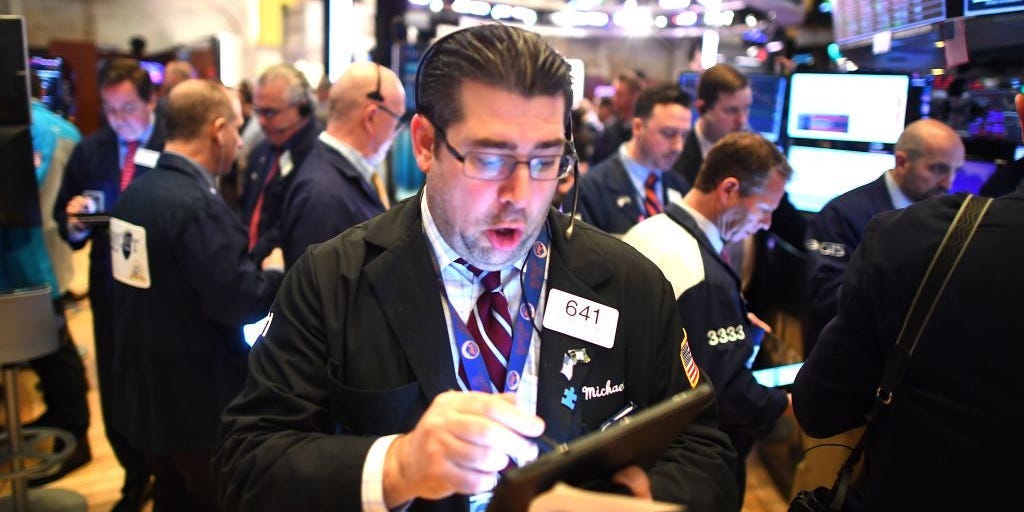
- US stocks closed higher Tuesday as investors digested the continued strength of corporate earnings.
- Fourth-quarter consensus EPS is tracking 6% above where it stood on January 1, higher than the historical average beat of 2.5%.
- Ahead, investors are anticipating the January CPI data Thursday. Economists are expecting a 7.3% surge in prices.
- Sign up here for our daily newsletter, 10 Things Before the Opening Bell.
The Nasdaq led US stocks higher on Tuesday while the Dow Jones Industrial Average jumped more than 300 points as investors digested another round of corporate earnings.
The S&P 500 and the tech-heavy Nasdaq rebounded from Monday's sudden, late-session reversal lower. US stocks have seen a volatile start to the year as investors grappled with a more aggressive central bank and worried about the economic damage from the Omicron variant.
But more recently, equities have rebounded, lifted by a steady flow of strong corporate earnings. Thus far, 276 S&P 500 companies have announced results, according to Bank of America. After a strong beat from Amazon, the fourth-quarter consensus EPS is now tracking 6% above where it stood on January 1, which is above the historical average beat of 2.5%.
Here's where US indexes stood after the 4:00 p.m. ET close on Tuesday:
- S&P 500: 4,521.54, up 0.84%
- Dow Jones Industrial Average: 35,462.78, up 1.06% (371.65 points)
- Nasdaq Composite: 14,194.46, up 1.28%
Looking ahead, investors are anticipating January consumer price index data due Thursday. Economists polled by Bloomberg are expecting a 7.3% surge, continuing the trend of prices rising at the fastest pace in about 40 years.
Such a reading could force the Federal Reserve to take a more aggressive path of interest rate increases this year. The consensus view is for the central bank to raise rates five times this year at 25 basis points each time, starting in March.
But for Brad McMillan, CIO at Commonwealth Financial Network, inflation may be peaking.
"In several of the sectors with the highest price increases, such as used vehicles, the pressure is starting to moderate," he said in a Tuesday note. "There are also signs the Fed is trying to tamp down expectations for rate increases. So, although worries are still high, we might well see them pull back a bit in February."
Carlyle Group co-founder David Rubenstein told CNBC inflation will soon dip to 4%-5% later in the year. The private equity billionaire also said the Fed will likely raise interest rates by 25 basis points in March though he does not think the central bank will hike rates in every meeting this year.
Peloton recovered losses and rose 12% after the company announced CEO John Foley will step down, and the embattled bike-maker revealed plans to cut 2,800 jobs. Foley is set to become executive chairman while former Spotify and Netflix CFO Barry McCarthy will take over as CEO.
Pfizer fell 4% after the COVID-19 vaccine maker revealed 2022 profit and revenue estimates that were below Wall Street's expectations.
Auto-sensor maker Velodyne Lidar jumped as much as 25% after issuing a warrant to an Amazon subsidiary to buy nearly 40 million shares.
In cryptocurrencies, bitcoin rose 0.46% to $44,075 Tuesday after hitting the $45,000 level, its highest in roughly a month. The coin dipped earlier in the session before recovering its losses.
The 10-year Treasury yield rose to 1.958% — a level last seen in 2019 — from Monday's 1.915% as investors brace themselves for the Fed's eventual rate hike. Bond yields move inversely to prices.
Oil prices cooled following a major run-up. West Texas Intermediate crude oil fell as much as 1.96% to $89.52 per barrel. Brent crude, oil's international benchmark, slipped as much as 1.89% to $90.94 per barrel.
Gold rose as much as 1.05% to $1,826.97 per ounce.










